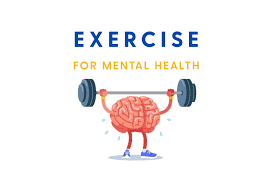Maintaining mental well-being is just as important as physical health, and exercise is crucial in promoting a healthy mind. The link between physical activity and mental health is profound and multifaceted, with numerous benefits that extend beyond the physical realm.
There are several ways in which exercise can help you achieve better mental health:
1. Release of Endorphins:
When you exercise, your brain releases endorphins, which are often referred to as "feel-good" hormones. These neurotransmitters act as natural painkillers, enhancing positive feelings, reducing stress, and boosting mood. Even a short workout or brisk walk can trigger endorphin production, leading to an immediate uplift in mood.
2. Stress Reduction
In today's fast-paced world, stress is almost impossible to avoid. Regular exercise is a powerful stress reliever. It helps in reducing cortisol levels, the hormone associated with stress and promotes relaxation by loosening tense muscles. Engaging in physical activity effectively combats the adverse effects of stress on both the mind and body.
3. Improved Sleep Patterns
Quality sleep is critical for mental health. Exercise can regulate sleep patterns, leading to better and more restorative sleep. It helps in reducing insomnia and enhancing the overall quality of sleep, leading to improved mental clarity and emotional stability.
4. Enhanced Self-esteem and Confidence
Regular exercise fosters a sense of accomplishment and boosts self-esteem. As individuals witness physical improvements and reach fitness milestones, they often experience a positive shift in self-perception, leading to increased confidence and self-worth.
5. Brain Health and Cognitive Function
Exercise has a positive impact on brain health. It promotes the growth of new brain cells and enhances connections between them, improving memory, cognitive function, and concentration. Exercise has shown promise in reducing the risk of cognitive decline and certain mental health conditions like dementia.
6. Social Interaction
Many forms of exercise encourage social interaction, whether through group classes, team sports, or workout buddies. Social connections are vital for mental health, providing support, motivation, and a sense of belonging, thereby reducing feelings of loneliness and isolation.
Integrating Exercise into Daily Life
Incorporating exercise need not be strenuous; consistency matters more than intensity. Finding activities one enjoys is key to sustaining a routine.
This could be anything from yoga and cycling to dancing or even gardening.
Aim for at least 30 minutes of moderate exercise most days of the week to experience the mental health benefits.
Conclusion
Exercise is a potent tool for promoting mental well-being, offering a holistic approach to mental health maintenance. Its ability to alleviate stress, improve mood, enhance cognitive function, and foster a positive sense of self makes it an invaluable ally in the pursuit of mental wellness.
By recognizing the profound impact of exercise on mental health and making it an integral part of our lifestyles, we can strive towards a healthier mind and body.






1 Comments
Great Blogs
ReplyDelete